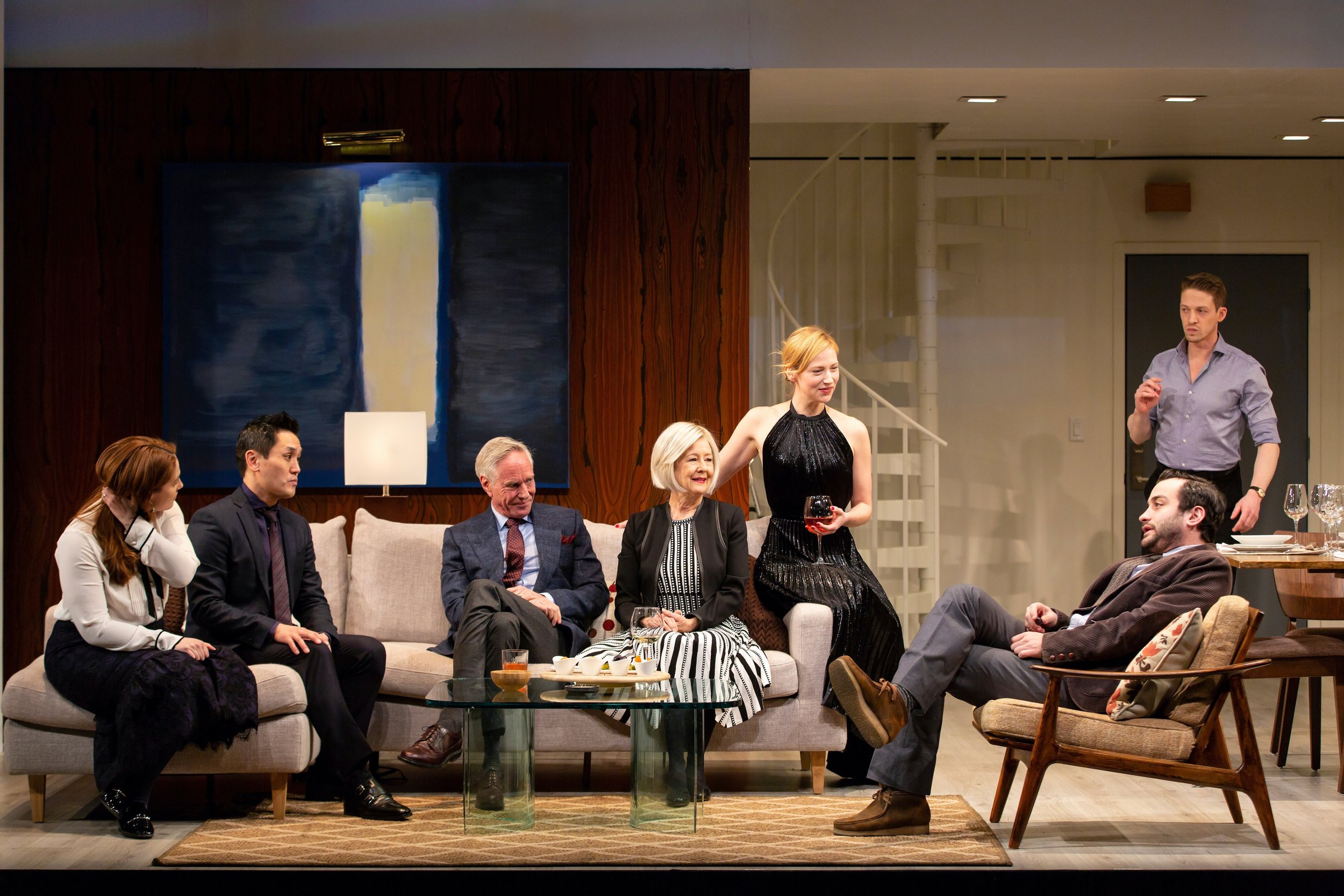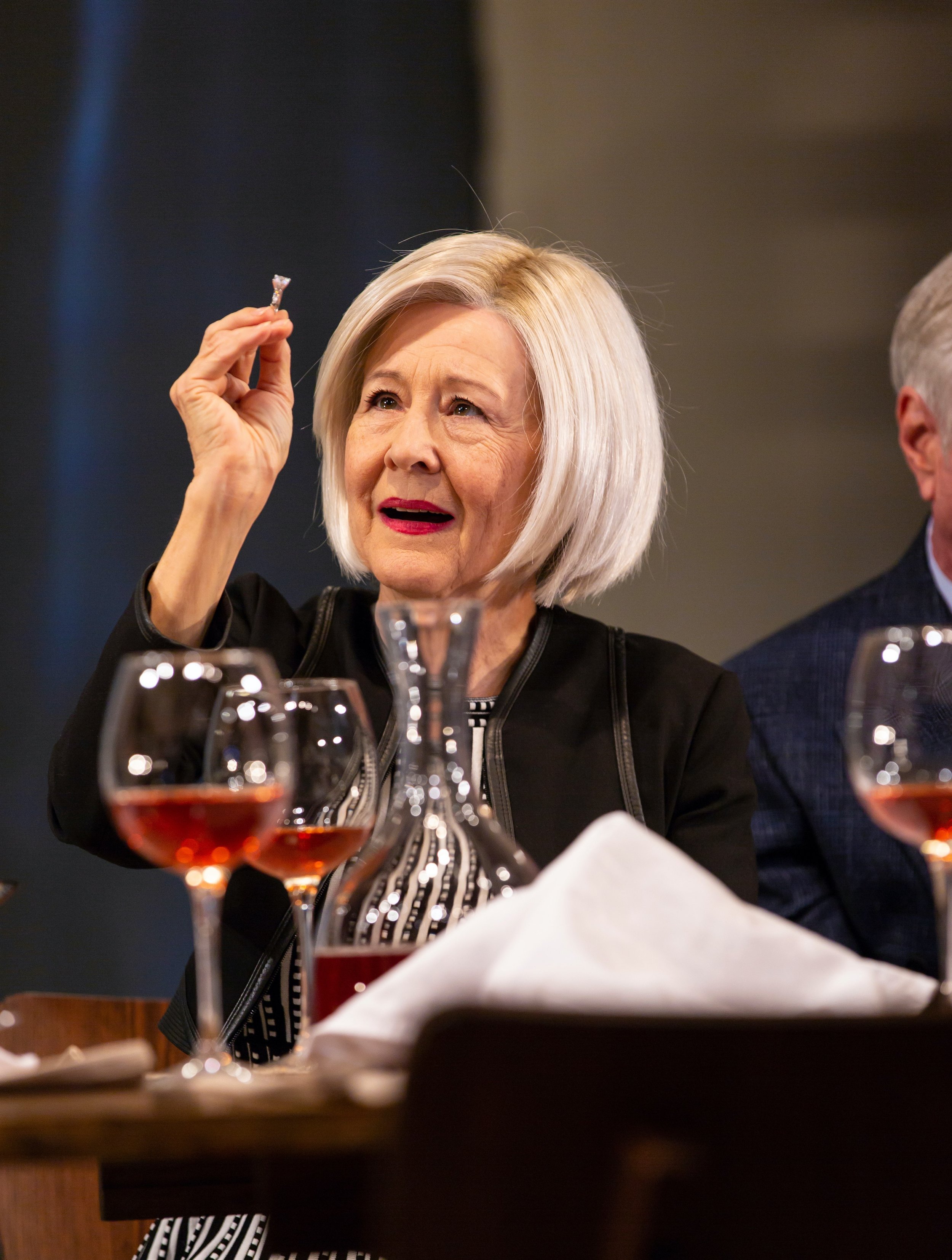Review of Pride and Prejudice, Long Wharf Theatre
Jane Austen’s much admired novel Pride and Prejudice got the Kate Hamill treatment in 2017. Hamill, trained as an actor, starred in new plays she adapted from old properties, allowing her, in the latter years of this decade, to assay three great heroines of British fiction: Marianne Dashwood (Sense & Sensibility), Becky Sharp (Vanity Fair), and Lizzy Bennet (Pride & Prejudice), as reconceived by her comic skills. The latter play, sans Hamill and directed by Jess McLeod, occupies the slot reserved for “a modern adaptation of a classic play” in the Long Wharf Theatre’s current season. In fact it’s a revival of a contemporary play adapted from a classic novel with some of the verve for skewering the 19th century that one finds, for instance, in the first act of Caryl Churchill’s Cloud 9. (From 1979, Cloud 9 was performed at Yale School of Drama in 2013 and Hartford Stage in 2017.)
Jane Bennet (Octavia Chavez-Richmond), Lizzy Bennet (Aneisa J. Hicks), Charlotte Lucas (Rami Margron) in Pride and Prejudice at Long Wharf Theatre, 2019
I was put in mind of the latter play by P&P’s use of comical casting, or casting against the grain. In Cloud 9, whoever plays the happy Victorian hunter and man of the house in Act One has to play a modern female child in Act Two. There, the doubling is mostly a jab at music hall comedy (men in female clothing having been trusted to raise guffaws for centuries). Here, when a very tall male (Luis Mareno) plays silly aristocrat Bingley as well as Mary, the most ill-favored of the Bennet clan (the third of four girls rather than Austen’s five), the hoary comic trope still lands, determined to inspire cheap laughs.
However, thanks to what Mareno does with the role, the doubling has perhaps something more behind it. Mareno makes Mary a loose cannon of odd asides, sad/funny bids for attention, and the kind of note-taking that family members readily store against others (“you locked me in a closet,” as a multivalent line, cuts more each time Mary says it). Likewise, the fact that whoever plays Mr. Bennet also plays Charlotte, the friend of Lizzy who takes one for the team by marrying unctuous Mr. Collins (Brian Lee Huynh, more later), lends a kind of paternalism to Charlotte and BFF status to Mr. Bennet. Here both roles are played by Rami Margron with notable command of both feminine and masculine registers.
Mary Bennet (Luis Moreno) in Pride and Prejudice at Long Wharf Theatre
The cross-casting is intrinsic to Hamill’s conception, letting the play step nimbly amongst the ruins of gender roles that performativity would have us progress beyond. What might push the theatrical effect a step further? All the cross-gender roles are ancillary. It’s still a story of boy, cast as such, meets girl, cast as such. While there’s no way anyone would mistake this for a faithful rendering of Austen, we don’t get anything really surprising either. At the Long Wharf, Pride and Prejudice is a comedy of manners where the posh British tones of classic Austen have been dismissed as mannered while the nonwhite cast is left to veer among mannerisms. How funny you find that I leave to you.
In my view, who fares best in this production—which is never quite as rollicking as it seems to hope it is (pacing!)—is Brian Lee Huynh. The actor has an always comical grasp of how to exploit the manner of each of his three parts. As the supercilious Miss Bingley—she detests those Bennet girls—Huynh might be a catty male in drag or a catty female past bloom (and dares you to tell the difference); as the caddish but sympathetic Mr. Wickham, he’s part comic villain, part dashing lead, and part ironic commentary on both, and as Mr. Collins, a poseur poised to marry at his patroness’s dictate, he’s divertingly daffy. In each role, both Austen and Hamill are well served. Well played.
Lydia (Dawn Elizabeth Clements), Mr. Wickham (Brian Lee Huynh) in Pride and Prejudice at Long Wharf Theatre
Elsewhere, the effects are more grab-bag, but Act Two lands better than Act One. The latter has not one but two grand balls where the lack of extras makes space itself seem to hang, while at home the fond rapport between Mr. Bennet and Lizzy (a linchpin of the novel) barely registers. Margron’s Mr. B. really comes into his own in Act Two when suitors come thick and fast. Jane Bennet (Octavia Chavez-Richmond), who’s supposed to be “the catch,” seems to be the rather tepid lover Darcy takes her for, early on. Chavez-Richmond has more fun with Miss Anne De Burgh’s neurasthenic quaver and a fantasy of Jane as temptress, both in Act Two. As Mr. Darcy, Biko Eisen-Martin does haughtily awkward well and bursts into pained eloquence in Act Two with force enough to melt even the skepticism of Lizzy, we imagine. As Lizzy, Aneisa J. Hicks, ever-arrayed in patterned culottes, seems willfully obtuse in Act One, but her passions and bashfulness come to the fore in Act Two (after Darcy does her a service and she gets to see the dude’s sumptuous domicile). And yet the pair’s happy-ever-after kiss is all but spoiled by the bad matches made by Charlotte and by Lydia.
As the youngest (fourteen), Lydia is played by Dawn Elizabeth Clements as a sitcom princess, all cutesy girlish sashay in Act One; in Act Two she reappears as the Mean Girl/Dame, Lady De Burgh, and, while Lydia’s ultimate comeuppance seems way harsh, Clements is at her best in making us register the heart-shaking incomprehension of the child-bride. As Mrs. Bennet, for whom railroading her daughters into the best possible marriages is the key to success, Maria Elena Ramirez is never as vacuous as the role is generally deemed (even by Austen, I daresay). Her gravitas comes from preemptive mourning over her girls’ missed chances, a sort of memento mori for the death-in-life that yawns when marriageability ends.
Lizzy Bennet (Aneisa J. Hicks), Jane Bennet (Octavia Chavez-Richmond), Mrs. Bennet (Maria Elena Remirez), Mary Bennet (Luis Moreno), Lydia Bennet (Dawn Elizabeth Clements), Mr. Bennet (Rami Margron) in Pride and Prejudice at Long Wharf Theatre
Costumes, by Izumi Inaba, are a riot of patterns and overlays on female characters that seem designed not to flatter their wearers (more of that against the grain aesthetic, I assume), though the male costumes generally do. The set by Gerardo Díaz Sánchez features a handsome staircase and ballroom/sitting-room—with a décor like a bordello on acid. Sound Designer/Original Music Composer Megumi Katayama’s boomy rhythms come through loud and clear but the dialogue at times less so amidst all the movement.
The Long Wharf’s Pride and Prejudice takes pride in overcoming any prejudices about who is able to play whom. Fine, but it could be much funnier.
Pride and Prejudice
By Kate Hamill
Adapted from the novel by Jane Austen
Directed by Jess McLeod
Set Design: Gerardo Díaz Sánchez; Costume Design: Izumi Inaba; Lighting Design: Jennifer Fok; Original Music & Sound Design: Megumi Katayama; Choreography: James Beaudry; Hair, Wig & Make Up Design: Samantha Abbott; Production Stage Manager: Kelsey Vivian; Assistant Stage Manager: Amy Patricia Stern; Casting by Calleri Casting
Cast: Octavia Chavez-Richmond, Dawn Elizabeth Clements, Biko Eisen-Martin, Aneisa J. Hicks, Brian Lee Huynh, Rami Margron, Luis Moreno, Maria Elena Remirez
Long Wharf Theatre
November 27-December 22, 2019









